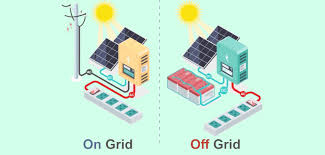As the world shifts towards sustainable energy, solar power stands out as one of the most efficient and eco-friendly solutions. But not all solar systems are the same. Two of the most popular options are On-Grid and Off-Grid Solar. In this post, we’ll explore how Ultimate On-Grid & Off-Grid Solar solutions give you flexibility, efficiency, and energy independence—perfect for both homes and businesses.
Understanding On-Grid Solar
On-grid, or grid-tied, solar systems are directly connected to your local electricity network. They supply power to your property while also interacting with the public grid.
Key Features of On-Grid Solar:
Net Metering: Excess energy is sent to the grid, earning you credits.
Lower Setup Cost: No need for battery storage if not required.
Reduced Electricity Bills: Offset your monthly utility costs.
Low Maintenance: Minimal upkeep compared to off-grid setups.
Best For: Urban and suburban areas where grid power is stable and readily available.
Understanding Off-Grid Solar
Off-grid solar systems operate independently of the electricity grid. They rely on battery storage to power your property at night or during cloudy days.
Key Features of Off-Grid Solar:
Total Energy Independence: No reliance on utility companies.
Perfect for Remote Areas: Ideal for locations with no or unstable grid access.
Self-Sufficiency: Power available during outages or blackouts.
Expandable Systems: Add more panels or batteries as energy needs grow.
Best For: Rural areas, farms, cabins, and anyone wanting complete independence from the grid.
Why Choose Ultimate On-Grid & Off-Grid Solar?
A hybrid solar power system combines the advantages of both on-grid and off-grid solutions. With this setup, you can use solar energy, store excess in batteries, and still draw from the grid when needed.
Benefits of Ultimate On-Grid & Off-Grid Solar:
Unmatched Reliability: Continuous power regardless of grid status.
Energy Savings: Offset bills while storing backup energy.
Flexibility: Easily switch between grid and stored solar power.
Eco-Friendly: Significant carbon footprint reduction.
Resilience: Prepared for power outages or emergencies.
Technical Components
A typical Ultimate On-Grid & Off-Grid Solar system includes:
High-Efficiency Solar Panels: Capture maximum sunlight.
Hybrid Inverter: Converts solar power for immediate use or battery storage.
Battery Bank: Stores excess energy for nighttime or cloudy weather.
Monitoring System: Real-time performance tracking via mobile or web apps.
Applications Across Sectors
Residential:
Lower electricity bills.
Secure backup during outages.
Long-term energy security.
Commercial:
Reduce operational costs.
Meet sustainability goals.
Ensure business continuity during blackouts.
Agricultural & Remote Areas:
Power farms, irrigation systems, and rural homes.
Independence from unreliable grid connections.
Cost Considerations & ROI
While hybrid systems generally cost more than standard setups, the long-term returns outweigh the investment:
Savings on Bills: Reduce or eliminate electricity costs.
Government Incentives: Many regions offer subsidies, rebates, or tax credits.
Energy Security: Priceless during outages or emergencies.
On average, a well-designed hybrid system can achieve ROI within 5–7 years, depending on location, energy usage, and available incentives.
Maintenance Tips
Panel Cleaning: Keep panels dust-free for optimal performance.
Battery Care: Follow manufacturer guidelines to extend battery life.
Monitoring: Use your system’s tracking software to identify issues early.
Professional Servicing: Schedule annual check-ups for maximum lifespan.
Conclusion
Ultimate On-Grid & Off-Grid Solar offers the flexibility, reliability, and sustainability you need for a secure energy future. Whether you’re a homeowner looking to cut bills or a business aiming for resilience and sustainability, a hybrid solar solution ensures you get the best of both worlds.
Start your journey toward energy independence today—power your life without compromise.


